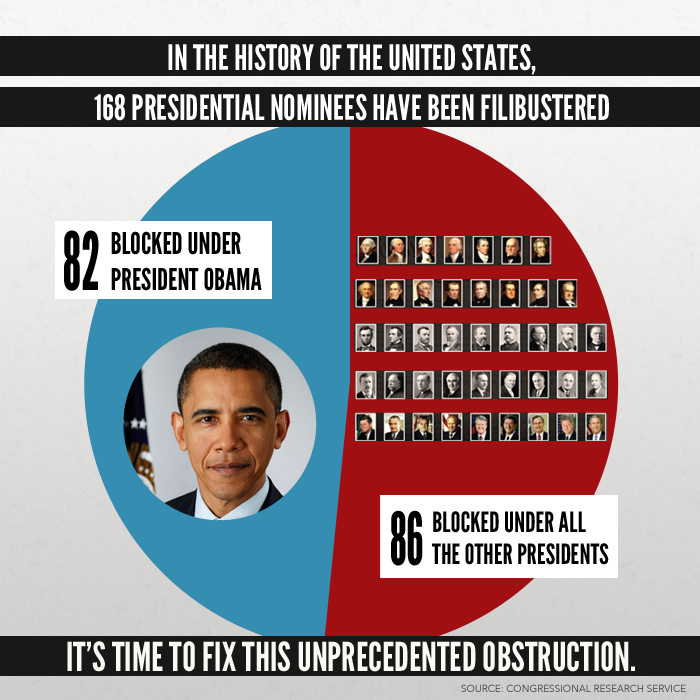Dusty Bake Activate
Fukk your corny debates
"It's about damn time"-
http://www.huffingtonpost.com/2013/11/21/senate-filibuster-reform_n_4316325.html

http://www.huffingtonpost.com/2013/11/21/senate-filibuster-reform_n_4316325.html
WASHINGTON -- Senate Majority Leader Harry Reid (D-Nev.) pulled the trigger Thursday, deploying a parliamentary procedure dubbed the "nuclear option" to change Senate rules to pass most executive and judicial nominees by a simple majority vote.
The Senate voted 52 to 48 for the move, with just three Democrats declining to go along with the rarely used maneuver.
From now until the Senate passes a new rule, executive branch nominees and judges nominated for all courts except the Supreme Court will be able to pass off the floor and take their seats on the bench with the approval of a simple majority of senators. They will no longer have to jump the traditional hurdle of 60 votes, which has increasingly proven a barrier to confirmation during the Obama administration.
Reid opened debate in the morning by saying that it has become "so, so very obvious" that the Senate is broken and in need of rules reform. He rolled through a series of statistics intended to demonstrate that the level of obstruction under President Barack Obama outpaced any historical precedent.
Half the nominees filibustered in the history of the United States were blocked by Republicans during the Obama administration; of 23 district court nominees filibustered in U.S. history, 20 were Obama's nominees; and even judges that have broad bipartisan support have had to wait nearly 100 days longer, on average, than President George W. Bush's nominees.
"It's time to change before this institution becomes obsolete," Reid said, before citing scripture -- "One must not break his word" -- in accusing Minority Leader McConnell (R-Ky.) of breaking his promise to work in a more bipartisan fashion.
McConnell responded to Reid by changing the subject to the Affordable Care Act and accusing Democrats of trying to distract Americans from the law's troubled rollout. Getting around to fidelity, McConnell noted that Reid had said in July that "we're not touching judges," yet he was now choosing to do so. Reid casually brushed off his suit coat and sat down.
McConnell compared the alleged duplicity to another Democratic piece of rhetoric. "If you like the rules of the Senate, you can keep them," he quipped, as the GOP side laughed heartily, which encouraged a pleased McConnell to turn directly to his colleagues and repeat the joke.
He then turned to the Democratic side and said he understood why inexperienced young members who'd never been in the minority might want to change the rules. "The rest of you guys in the conference should know better," he said.
Obstruction, McConnell said, began with the Democrats when they decided to filibuster Circuit Court nominees under Bush. "They made it up. They started it," he said, arguing that Republicans were only following their lead. His argument, though, raises the question of why eliminating the filibuster on such judges, if it was never used before 2000, should be seen as an historic development in the first place.
"Stop trying to jam us," McConnell said, warning that it would come back to haunt them. "You may regret it a lot sooner than you think."
Normally rules changes in the Senate need 67 votes, but the majority can challenge an existing rule, and if the presiding senator rules against the challenge, the majority can then ask for a vote on the chair's ruling. If a simple majority votes to overrule the chair, it sets a new precedent.
Sens. Carl Levin (D-Mich.), Mark Pryor (D-Ark.) and Joe Manchin (D-W.Va.) broke with their party and joined Republicans in opposing the move. Pryor is in an uphill reelection contest, which may explain his vote, but Sens. Mary Landrieu (D-La.) and Mark Begich (D-Alaska), who are also top GOP targets in 2014, backed the rules change.
Levin, a Senate traditionalist, has long been the most outspoken opponent of rules reform, and led a successful effort to stymie the movement earlier this year. Manchin, meanwhile, has great reverence for the late Sen. Robert Byrd (D-W.Va.), a fierce champion of Senate tradition, likely explaining his vote. (Byrd did make several attempts to change the rules himself when he served as majority leader.)
Sen. Jack Reed (D-R.I.), who has long been skeptical of changing the rules, cast a critical vote very late in the process supporting the move. That left Sen. Barbara Boxer (D-Calif.), a recent convert to reform, to cast the 51st vote, with Reid casting the 52nd.
The move marks a significant win for the newer crop of Democrats -- like Oregon Sen. Jeff Merkley, the lead proponent of going nuclear -- who have grown increasingly frustrated as McConnell expertly employed parliamentary procedures to stall Democratic nominees and initiatives.
But Sen. Orrin Hatch (R-Utah), who chaired the Judiciary Committee back when it was Democrats trying to stall Bush's nominees, echoed McConnell, suggesting newer Democrats such as Merkley, who have never been in the minority, were not taking the long view.
"They're -- I want to say this the right way -- they're rustling their inexperienced feathers," Hatch said, calling the historic move a "charade just to try and get off Obamacare."
"It's raw power that they're exercising, that, like I say is a very dangerous thing for them to do, Hatch said. "They're going to rue the day they do it."

 at nobody addressing the elephant in the room
at nobody addressing the elephant in the room